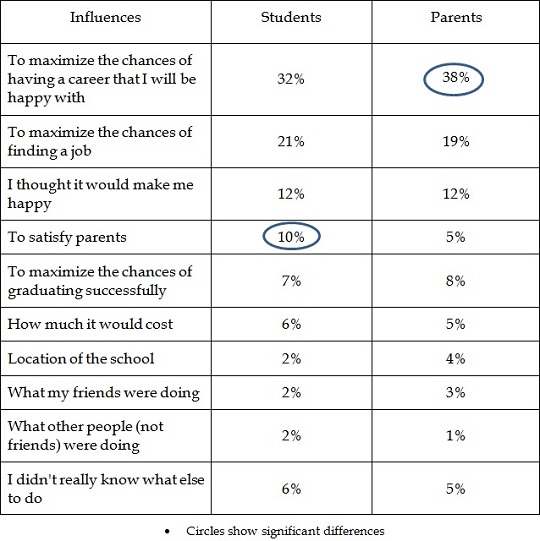Three in Ten (28%) Post-Secondary Students Agree they Chose their Program of Study to Please their Parents
Students and Their Parents Don't Always See Eye-to-Eye When it Comes to School and Life After
Three in ten (28% - 7% strongly/21% somewhat) students `agree' that they `chose the program they're in to please their parents' while seven in ten (72% - 46% strongly/26% somewhat) `disagree'. However only two in ten (21% - 5% strongly/16% somewhat) parents `agree' that their children `chose the program they're in to please them' while eight in ten parents (79% - 55% strongly/23% somewhat) `disagree', under-estimating the impact they have on their children's school-related decisions.
Moreover, parents also play a big part in whether or not their child decides to go to post-secondary school at all, with one in ten students (10%) saying the decision to go to post-secondary school is a result of them trying to satisfy their parents. Meanwhile, only 5% of parents think their child goes to post-secondary school to satisfy them. A desire to satisfy their parents is only one of many influences on what makes students decide to go to post-secondary school, with the chart below displaying other influences and the proportion of parents that agree their child was driven in this manner.
Three quarters (75% - 41% very/33% somewhat) of post-secondary students say that they are `concerned about choosing a program that doesn't help them get a job after graduation' while one quarter say they are not concerned (25% - 8% not at all/17% not very). However, only two thirds (66% - 27% very/38% somewhat) of parents say that their children are concerned about the matter, while one third (34% - 11% not at all/23% not very) say their kids are not concerned.
Parents and students don't see eye to eye on what will bring students happiness after graduation with significantly more parents (67%) saying that finding a job that is meaningful and fulfilling will bring their child happiness, but only 42% of students agree with parents. Other large discrepancies in what will bring students happiness after graduation between students and parents include making lots of money (14% students/8% parents), travelling (12% students/4% parents), finding love (8% students, 2% parents), paying off debt (6% students/2% parents) and prestige (3% students/1% parents). However, students and parents see eye to eye on two influences - getting a job (15% students/16% parents) and the envy of peers/friends (1% students/1% parents).
The 2015 RBC Student Finances Poll was conducted by Ipsos Reid through a national online survey of 1,003 students aged 17 to 24 and of 1,001 parents of students in post-secondary school (as of September 2015). Data were collected from June 23 to July 7, 2015. The results are based on a sample where quota sampling and weighting are employed to balance demographics and ensure that the sample's composition reflects that of the actual Canadian student population according to Census data. Quota samples with weighting from the Ipsos online panel provide results that are intended to approximate a probability sample. Unweighted, probability samples of this size, with 100 per cent response rate, would have an estimated margin of error of 177 3.5 percentage points, 19 times out of 20, for each sample group. All sample surveys and polls may be subject to other sources of error, including, but not limited to, coverage error and measurement error.
For more information on this news release, please contact:
Sean Simpson
Vice President
Ipsos Public Affairs
(416) 572-4474
[email protected]
About Ipsos in Canada
Ipsos is Canada's market intelligence leader, the country's leading provider of public opinion research, and research partner for loyalty and forecasting and modelling insights. With operations in eight cities, Ipsos employs more than 600 research professionals and support staff in Canada. The company has the biggest network of telephone call centres in the country, as well as the largest pre-recruited household and online panels. Ipsos' marketing research and public affairs practices offer the premier suite of research vehicles in Canada, all of which provide clients with actionable and relevant information. Staffed with seasoned research consultants with extensive industry-specific backgrounds, Ipsos offers syndicated information or custom solutions across key sectors of the Canadian economy, including consumer packaged goods, financial services, automotive, retail, and technology & telecommunications. Ipsos is an Ipsos company, a leading global survey-based market research group.
To learn more, please visit www.ipsos.ca.
About Ipsos
Ipsos is an independent market research company controlled and managed by research professionals. Founded in France in 1975, Ipsos has grown into a worldwide research group with a strong presence in all key markets. Ipsos ranks third in the global research industry.
With offices in 86 countries, Ipsos delivers insightful expertise across six research specializations: advertising, customer loyalty, marketing, media, public affairs research, and survey management.
Ipsos researchers assess market potential and interpret market trends. They develop and build brands. They help clients build long-term relationships with their customers. They test advertising and study audience responses to various media and they measure public opinion around the globe.
Ipsos has been listed on the Paris Stock Exchange since 1999 and generated global revenues of e1,669.5 ($2,218.4 million) in 2014.
Visit www.ipsos.com to learn more about Ipsos' offerings and capabilities.

![[WEBINAR] TOAST 2025 The Sip Spectrum: The Multifaceted World of Modern Drinking](/sites/default/files/styles/related_more_insights/public/ct/event/2025-08/thumb.jpg?itok=L18Y1o3A)
![[WEBINAR] Ipsos Global Trends 2025: Canadian Edition](/sites/default/files/styles/related_more_insights/public/ct/event/2025-08/thumbnail-templates_5.png?itok=hLtbMkre)
